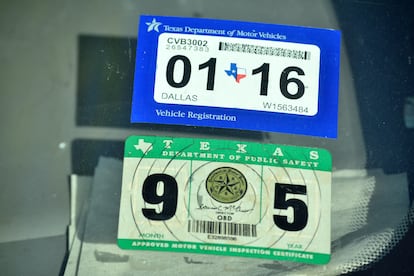The new laws that will take effect in Texas in 2025
The Texas Privacy and Data Security Act, which went into effect in July 2024, will be extended in 2025. Similarly, other legislation will be enacted on the first day of the new year

Beginning January 1, 2025, Texas residents will see significant changes in legislation, including the elimination of mandatory vehicle safety inspections, expanded rights to control personal data, new courts to ease judicial workloads, and adjustments to property tax relief measures for schools. Below is an explanation of each of these new laws:
Elimination of vehicle safety inspections
Mandatory safety inspections for non-commercial vehicles will no longer be required. Instead, Texans will pay a $7.50 “inspection program replacement fee” when registering their vehicles. New vehicles of the two most recent models that have not been previously registered will have to pay a higher initial fee of $16.75, which will cover their first two years of registration.
It should be noted that emissions inspections are still mandatory in some counties, such as Harris, Travis and Dallas, among others. In addition, Bexar County will implement emissions inspections beginning in 2026. Although commercial vehicles must still undergo safety inspections, they are exempt from the replacement fee.

Texas Data Security and Privacy Act Update
The Texas Privacy and Data Security Act, which initially went into effect in July 2024, will be extended in 2025. Texans will have new tools to control how their personal data is used online. Key features include the ability to use browser settings, device preferences or web extensions to opt out of companies processing their personal information.
This process requires active user consent, ensuring that individuals are aware of their choices. Texans can now demand transparency from companies about data collection, correct inaccuracies and opt out of targeted advertising, data selling or profiling.
New judicial districts and courts
To alleviate the growing caseload in Texas courts, the legislature passed House Bill 3474, resulting in the creation of new judicial districts. Effective January 1, 2025, Edwards, Gillespie and Kimble counties will share the 499th Judicial District. In addition, on October 1, 2025, the 498th Judicial District will be established in Kendall County. This is intended to improve efficiency and access to justice throughout the state.
Property tax relief for schools
Senate Bill 2 introduces a mechanism to protect school budgets from declining property tax revenues. Beginning in 2025, schools will be able to apply for additional state funding if local tax revenues fall short due to tax limitations, especially for elderly and disabled homeowners.
In addition, the Texas Education Agency will now publish the maximum compressed rate (MCR) for each school district. The MCR determines the tax rate that districts must apply to receive full funding, which would ensure the financial stability of the education system.
Updates to the Texas Code of Criminal Procedure
Act 4504 revises the Texas Code of Criminal Procedure to make the laws more logical and easier to navigate. Although the changes focus on reorganization, they do not alter the meaning of the laws.
Tu suscripción se está usando en otro dispositivo
¿Quieres añadir otro usuario a tu suscripción?
Si continúas leyendo en este dispositivo, no se podrá leer en el otro.
FlechaTu suscripción se está usando en otro dispositivo y solo puedes acceder a EL PAÍS desde un dispositivo a la vez.
Si quieres compartir tu cuenta, cambia tu suscripción a la modalidad Premium, así podrás añadir otro usuario. Cada uno accederá con su propia cuenta de email, lo que os permitirá personalizar vuestra experiencia en EL PAÍS.
¿Tienes una suscripción de empresa? Accede aquí para contratar más cuentas.
En el caso de no saber quién está usando tu cuenta, te recomendamos cambiar tu contraseña aquí.
Si decides continuar compartiendo tu cuenta, este mensaje se mostrará en tu dispositivo y en el de la otra persona que está usando tu cuenta de forma indefinida, afectando a tu experiencia de lectura. Puedes consultar aquí los términos y condiciones de la suscripción digital.









































